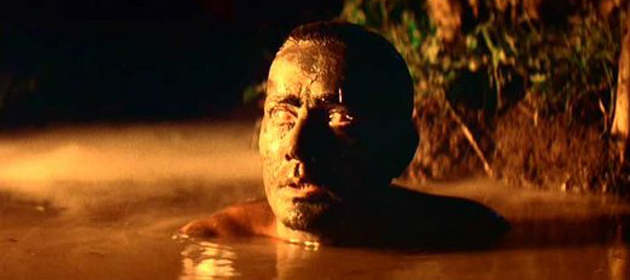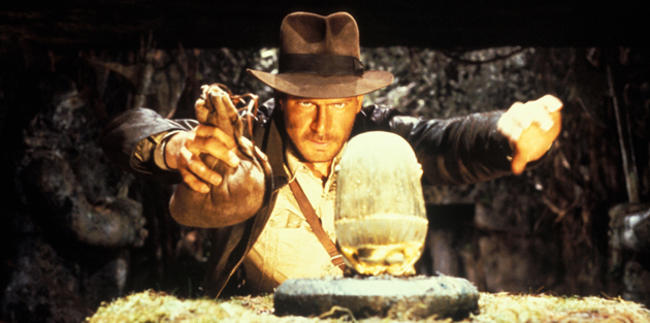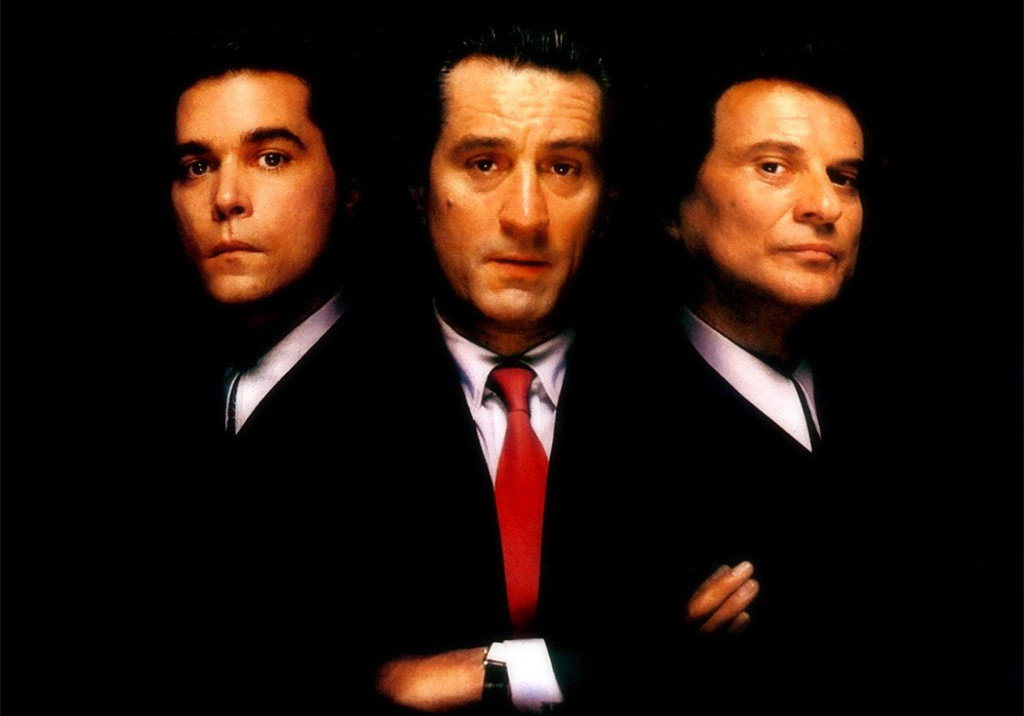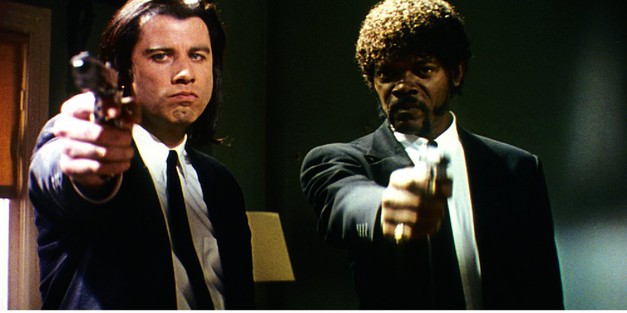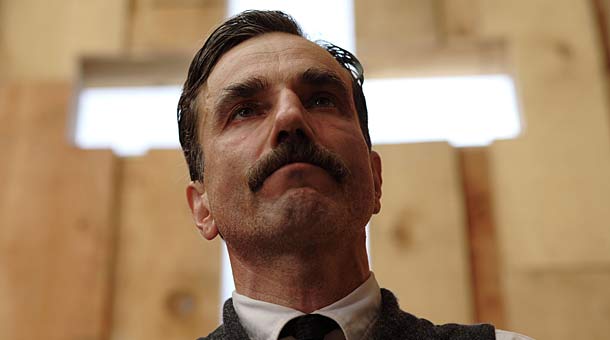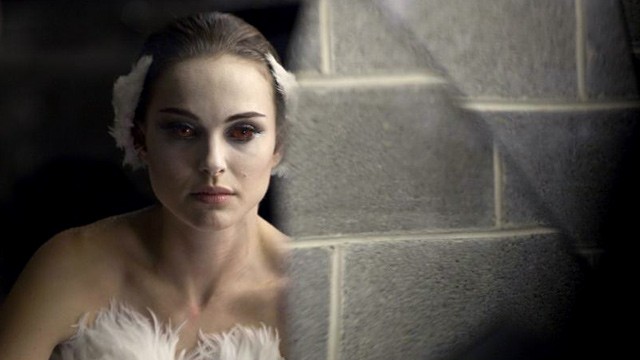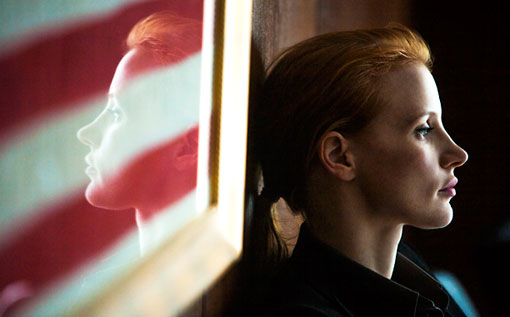8. Apocalypse Now
It is surprising we are able to talk about this film at all, given its horrible production troubles ranging from tropical storms to heart attacks to inordinate weight gain. Even with all the strife, Francis Ford Coppola’s adaptation of Joseph Conrad’s Heart of Darkness is a powerhouse.
Every performer is great, but despite only being on screen for one scene, Marlon Brando steals the show as the unhinged Colonel Kurtz. Violent, hallucinatory, and compulsively watchable, the film was nominated for eight awards, winning two for Cinematography and Sound mixing. The complex, abrasive film ended up losing Best Picture to divorce-drama Kramer vs. Kramer.
9. Raiders of the Lost Ark
It’s hard to imagine a time before Indiana Jones. There were action heroes before him, there were countless after him, but Harrison Ford’s depiction of the adventure-seeking, whip-wielding archaeologist reaches badass nirvana.
While part of this is due to Indy’s wit and charm, what makes him such a lasting hero is his fallibility. He gets hurt, he makes bad decisions, he seems like he’s not going to be able to save the day. Ultimately, of course, he triumphs, but seeing the journey is joy, and one that is rarely replicated in modern day adventure movies. It ended up getting nominated for nine Oscars, winning all the technical ones but losing Best Picture to Chariots of Fire.
10. Goodfellas
Martin Scorsese’s nostalgic romp through mob-infested 1950-‘80s is a classic. Beautifully structured, the two and a half hours fly by as we follow Henry Hill (Ray Liotta) work his way up in the mafia. It has one of the most famous tracking shots of all time, and arguably the most famous Joe Pesci line. It has barely aged in the 24 years since its release, still feeling fresh and innovative.
Scorsese would use a similar structure and tone with this year’s Wolf of Wall Street, trading in gangsters for stock brokers (what’s the difference LOLZ). When it came time for Oscar night, the film gathered up six nominations, but only Joe Pesci walked away with a golden statuette. The film lost Best Picture to the Kevin Costner Native American epic Dances with Wolves.
11. Pulp Fiction
The time before Pulp Fiction was a strange one. Few had heard of Quentin Tarantino, movies followed a linear, logical progression, John Travolta was fading into obscurity, and indie films had no business competing with studio giants.
All that changed after its monumental premier at Cannes. Critics tripped over themselves heaping praise on the film. Students immediately started aping Tarantino’s dialogue and structure in their projects. All over the country, people were quoting Jules’ faux-bible passage. It revitalized a stagnating indie film industry, and forever changed the way people viewed narrative structure.
The Academy graced the film with seven nominations, of which it won only one, for Best Writing. Forrest Gump walked with Best Picture that year, to the head-scratching befuddlement of everyone who looks back at the two films today.
12. Fargo
The Coen Brothers’ darkly comic tale is about a kidnapping-gone-wrong in the cold winter landscape of North Dakota. There is a lot to love about this movie, from the excellent performances by William H. Macy, Frances McDormand, and Steve Buscemi to the atmospheric dialogue, full of “ja’s” and “y’know’s” that color the setting and make it seem like a place you could actually go to. It is funny, violent, and by the end, surprisingly poignant.
The Academy took notice of it upon its release, nominating the film in seven categories. It won two, Best Actress for McDormand and Best Original Screenplay, but lost Best Picture to The English Patient, a film no one has watched in 17 years.
13. There will be Blood
It’s fun to imagine eager gore hounds hearing the name of this film and dashing to the theater expecting to watch something in the same vein of Saw, only to be greeted with the slow-burning, existential character study it actually is (editors note: It is unlikely anybody actually made this mistake).
Anchored by Daniel Day-Lewis’s powerhouse performance as Daniel Plainview, it is a grim, relentless, sweaty masterpiece. The name sets up a promise that it is eager to keep, and the viewer feels palpable dread throughout its nearly three hour runtime. When it came time for Oscar night, it picked up 8 nominations, but won only two. It lost Best Picture to the Coen brothers’ own grim, relentless, sweaty masterpiece: No Country for Old Men.
14. Black Swan
Who knew ballet could be so intense? Well, a lot of people probably, but for the majority of Americans, the name “Swan Lake” conjures up ideas of six year olds in frilly dresses. There is no such nicety in Darren Aronofsky’s film, only body horror and finger-gnawing neuroses.
Nina Sawyer (Natalie Portman) has been dancing with her ballet company for years, and finally gets her chance in a starring role. She has the White Swan down pat, with her perfect technique and fastidious rehearsing, but she can’t seem to nail down the unhinged passion of the Black Swan. Enter Lily (Mila Kunis), a hard-partying bad girl, and once the two pair up, Nina’s already fragile mind starts to unravel.
Stylish and creepy, this film is a great thriller in an unusual atmosphere. Earning five nominations, the film lost the crowded Best Picture category to The Kings Speech, which also edged out films such as 127 Hours, The Fighter, Inception, Toy Story 3, The Social Network, and True Grit.
15. Zero Dark Thirty
Katherine Bigelow already dissected the war in the Middle East in her Oscar winning Hurt Locker, but Zero Dark Thirty does not feel like a retread in the slightest.
Maya (Jessica Chastain) is tasked with the enormous task of hunting down Osama Bin Laden after the 9/11 attacks. Nobody is entirely sure how to go about doing this, but a lot of her contemporaries seem to think torturing the information out of prisoners is the route to go.
Upon initial release, it garnered a lot of negative attention for a purported “glorification of torture,” which is frankly ridiculous. While there is plenty of torture, by the end it is clear the film argues about the pointlessness of torture, saying that there are better ways to get results. One of the few movies to focus on the military without actual military involvement, it did not shy away from making America look bad.
Perhaps that is why the Academy chose to award Best Picture instead to Argo, a film that also deals with terrorists, but shows Americans figuring out a way to save hostages in the most patriotic and clean way possible.
Author Bio: Will has been watching movies since birth and writing about them since adolescence. When not bowing before the alter of celluloid gods, he enjoys music, books, and the outdoors. Never miss one of his inconsequential thought and follow him on twitter, @wabray17.
